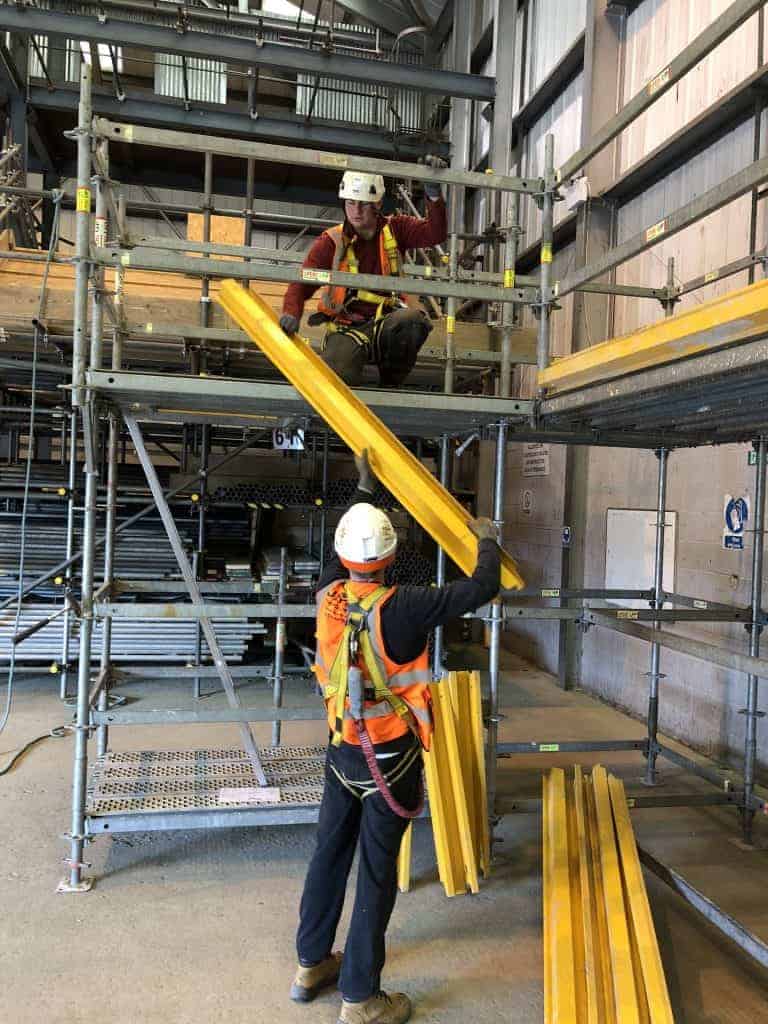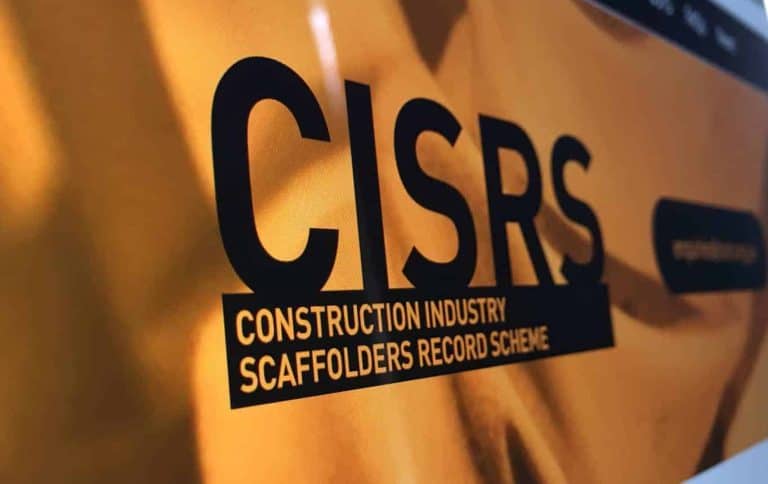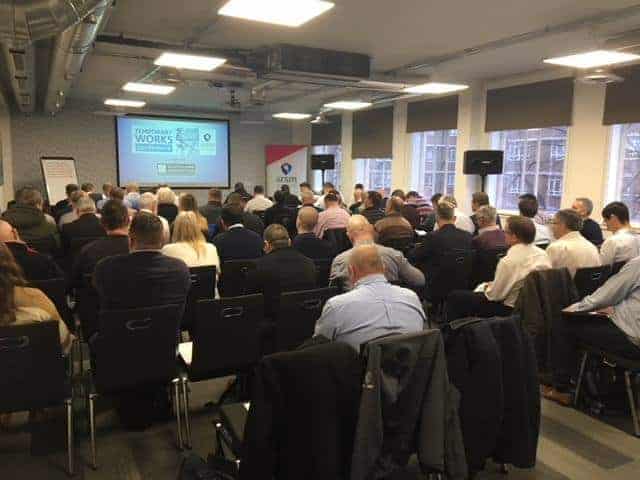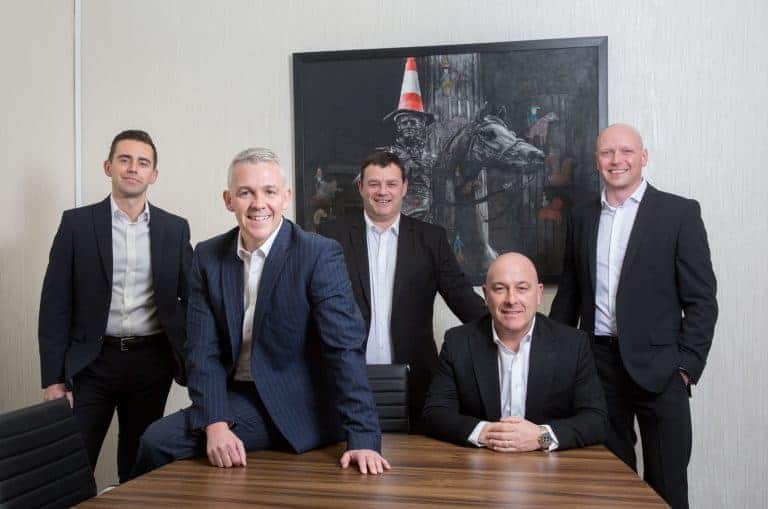Wood wins key role on Hinkley Point C project
Wood has secured a new contract to provide a construction design management advisor service for the Hinkley Point C new build nuclear power station project in the UK.
The new contract gives Wood a key strategic role in the project’s Technical Management and Acceptance team, which is responsible for implementing construction regulations and managing design risk assessments.
Effective immediately, the contract with station developers EDF Energy will see Wood engineers working to help mitigate design risks and prepare for site implementation, achieving safety through design, better value for money and greater efficiency.
Bob MacDonald, CEO of Wood’s Specialist Technical Solutions business, said: “We are looking forward to working with EDF Energy on another aspect of this project which is so vital to the UK’s future energy security. Our nuclear business has played a key role in every UK nuclear new build and this contract supports our strategy to increase our involvement at Hinkley Point C, where we already provide safety case and engineering support, equipment qualification services in several key areas, and are sole suppliers for independent verification of ultrasound inspections on safety critical components.”
PERI Delivers First Ever BASE Course
Last week, PERI delivered its first 5-day CISRS-accredited BASE course to apprentices from J.MAC Scaffolding.
The course, which took place at NETA’s training centre in Middlesbrough, is one of many ways the business is helping to increase the number of skilled operatives in the industry and demonstrate the benefits of system scaffolding. PERI’s Scaffolding Instructor, Mark Holmes, who led the course, believes that the BASE training course in particular will help meet the growing demand for skilled scaffolders. He added, “I feel this course gives apprentices a good insight into system scaffolding as they embark on their scaffolding careers, including the opportunity to erect basic structures. It also gives them an understanding of Working at Height Regulations 2005 and safety guidance from NASC SG4.15 Preventing Falls in Scaffolding Operations. Seeing the apprentices learning and grasping the PERI UP system concept by the end of the course gives me great job satisfaction, and I think it’s definitely a step in the right direction for PERI.” The BASE course is designed for non-scaffolders looking to pursue a career in the industry. It prepares them by replicating real-life site situations during training. Trainees are taught the fundamentals of scaffolding, which provides them with the basic skills and knowledge to erect, modify and dismantle system scaffolding in just five days. Non-scaffolders gain practical experience by training with the PERI UP Flex system, which is the formwork and scaffolding provider’s response to high quality, flexible and safe system scaffolding. Successful completion of the BASE course meant the apprentices from J.MAC Scaffolding qualified for a BASE scaffolding card endorsed by CISRS. This will enable them to carry out basic scaffolding operations on most project sites. Recognition from CISRS will also open up further career opportunities in the field.
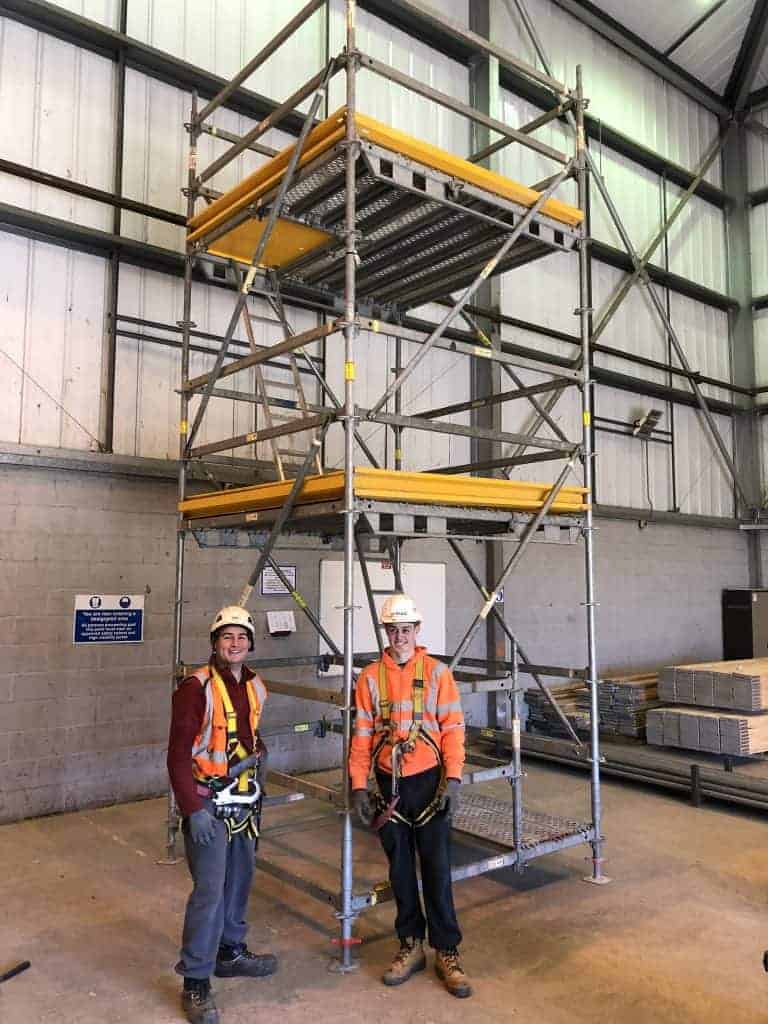 With easier assembly and disassembly operations, PERI believes system scaffolds are the way forward for any access solution. In addition to the BASE course, PERI are offering advanced CISRS-accredited courses, such as the inspection course, enabling qualified scaffolders the chance to enhance their technical skills.
With easier assembly and disassembly operations, PERI believes system scaffolds are the way forward for any access solution. In addition to the BASE course, PERI are offering advanced CISRS-accredited courses, such as the inspection course, enabling qualified scaffolders the chance to enhance their technical skills. CISRS Increases CPD availability
Due to industry demand, the Construction Industry Scaffolders Record Scheme (CISRS) has increased the availability of its CPD courses.
The scheme says the increase in CPD training will be generated by now allowing core scheme centres, those that offer Part 1, Part 2 and Advanced Scaffolder CISRS courses at their main training centres. These will be able to deliver CPD at their network of facilities across the UK.
According to a CISRS statement, ‘These centres must have sufficient space to house the inspection structures and carry out the mobile access tower module, suitably qualified instructors, and approval from CISRS prior to any training taking place.’
The availability increase comes after a recent review of course availability and centre capacity, in which a shortage of CPD courses was identified in some areas.
The scheme says this increased availability is expected to alleviate this issue. However, CISRS will continue to review the situation.
PHD says investment in staff is key after latest award success
As previously reported the PHD Group retained this year’s prestigious Access and Scaffolding Specialist award. Reflecting on the win the access firm has said much of its success is put down to its continued investment in staff development and welfare.
The much-coveted title comes from the Construction News Specialist Awards 2019 evening, held last month at the Grosvenor House Hotel in London. Judges described PHD Group as ‘setting the pace in an incredibly tough sector’ and highlighted the complicated scaffolding work the company has carried out around Big Ben as the iconic 96 metre tall tower undergoes an extensive restoration programme. But the judging panel was equally impressed by the business’s commitment to its staff. The judges commented: ‘While Elizabeth Tower was a flagship project in 2018, the firm also provided innovative solutions on high-profile jobs such as Harrow Square (working for Barratt) and Deptford Foundry (Anthology/John Sisk), both of which were adjacent to live rail lines and had restricted access. ‘For staff, the firm offered free health checks, regular mental health talks and flu jabs. It also handed out 25 of its own health and safety awards for operatives last year. ‘The group invests in training and professes to offer clear career-development paths, while promoting fairness, inclusion and respect in the workplace.’ Danny Dwyer, Managing Director of PHD Group, said he was delighted that the judges had highlighted the investment the company makes in its staff as well as the access solutions it provides to complicated projects. Mr Dwyer said: “Any company is only as good as its staff and its an important part of our ethos that employees at all levels have the best possible training, welfare and working conditions. “We believe that by investing in our employees we are helping to create a happy, productive workplace that ultimately benefits the customer as they have a highly motivated team working on their projects. “Because we are an innovative firm that comes up with specialist solutions to difficult problems its important that our staff are trained in a particular way and buy into that ethos. We took on 22 apprentices in 2018 and hope to take on a further 30 this year. We’re delighted that the judges recognised our commitment to people and building up a good company culture.” Earlier this year PHD Group announced that it planned to create a national infrastructure of access companies across Britain through an acquisitions programme. The company plans to create regional hubs in key geographical areas and is already targeting Cambridge, The Midlands and the Northern Corridor. Alan Brockhouse, CEO of PHD Group, said: “It’s a huge achievement to win this award for consecutive years and we feel that it puts us in great stead as we look to start creating a national infrastructure for the company in 2019. “One of our key considerations when looking to buy a company is that they will have the ability to take on and adopt the company ethos that we have created. “All the staff have worked incredibly hard and deserve huge credit.”HAKI Secures Multi-Million-Pound Investment From Enigma Industrial Services
System scaffolding provider, HAKI Scaffolding has just secured a significant multi-million-pound investment from Enigma Industrial Services Ltd (formerly Interserve Industrial Services).
The purchase involves more than 2,500t of scaffolding equipment, making Enigma one of the largest stockholders of HAKI Universal in the UK. Details of the deal were announced this week via HAKI Scaffolding’s parent company, Midway Holding AB, who revealed Enigma Industrial Services would be making a “considerable asset purchase” consisting of HAKI Universal Scaffolding and various HAKI stair tower systems and loading bays. The large-scale purchase is from ’consigned’ long-term hire stock, as used on recent projects, such as The Ropeworks in Edinburgh, maintenance contracts, such as the Syngenta Manufacturing Site in Yorkshire and multiple housing, office and student accommodation developments throughout the country. The deal has been brokered by HAKI Scaffolding UK’s Chris Stokes, working with Enigma Industrial Services MD, Scott Hardie and Procurement & Asset Management Director, Alan Scott. HAKI’s Chris Stokes said: “This deal is fabulous for HAKI and represents great business for Enigma Industrial Services too. It cements the relationship between Enigma and HAKI and supports the ongoing collaboration on some of the UK’s biggest and brightest projects”. “Their exceptionally high standards and unrivalled safety record can only be aided by the purchase of this huge amount of HAKI Scaffolding product, which will help them continue to deliver, fast, cost-efficient and safety-focused design solutions in the future. It’s been a pleasure doing business with them and providing them with the equipment to offer outstanding levels of productivity and safety for decades to come.”IIRSM & Scaffolding Association Partner on Second Temporary Works Conference
The International Institute of Risk and Safety Management (IIRSM) and The Scaffolding Association (SA) have been working together for their Temporary Works events.
In a statement, SA report that their London event held in March was very successful and their next conference takes place at Edgbaston Stadium, Birmingham, B5 7QU on Wednesday 3rd April 2019. SA says the event will stress again the importance of managing temporary works effectively and fill the gaps for those responsible for planning and monitoring the temporary works phase of a construction project. With both organisations firmly believing in practical and straight to the point training, the sessions will be delivered by industry specialists with extensive experience in the construction sector. Booking details can be found on www.iirsm.org/tempworks Robert Candy, CEO of The Scaffolding Association said: “There are still major gaps in how temporary works are managed due to the lack of understanding by those thrust into the role. We frequently see cases that highlight that a wider understanding is needed, not just from those who fulfil the role of TW designer or co-ordinator. Giving more confidence and knowledge to everyone involved in the process can only be of benefit.” Clare Fleming of the IIRSM said: “With around 40% of our membership working in the construction sector, I’m delighted that we’ve been able to partner with the Scaffolding Association on such an important topic.” The speakers will be Robert Candy (CEO, The Scaffolding Association), Professor Rudi Klein (CEO, The SEC Group) and Dr Mike Webster (MPW R&R Consulting).Sydney Scaffolding Collapse Kills Teen Apprentice
A large section of scaffolding has collapsed at a building site in Sydney killing an 18-year-old apprentice and seriously injuring another.
Apprentice Christopher Cassantiti was reported to have fallen from a height of almost eight-storeys when a large section of scaffolding suddenly collapsed at Macquarie Park worksite. The collapse occurred today (Monday 12:20pm) (ACT). Due to the amount of debris at the scene, rescue crews sadly had difficulty reaching the apprentice. He was pronounced dead a few hours later. A 39-year-old co-worker was also severely injured in the collapse, he was taken to hospital in a critical condition. An investigation by SafeWork NSW is now underway to ascertain why the 17-meter high scaffold collapsed. A spokesperson for construction union CFMEU said: “Such tragedy should not occur. We will update members as more is known.”UK Scaffolding Firm Flying High To Beat Pollution
London based MR Scaffolding Services Ltd are set to take part in a revolutionary project aimed at meeting new government requirements on vehicle pollution in the capital.
By using specially modified heavy-duty drones to deliver materials to sites both in and around London, the company will avoid breaking Ultra Low Emission Zone requirements introduced by the City’s Mayor aimed at improving air quality. From April 8th 2019, any HGV vehicle not carrying a low emission engine will be fined £100 each time it enters the zone. The move will ensure London has the world’s toughest standards on emissions.Taking A Stand
The Mayor of London, Sadiq Khan said: “The air in London is lethal and I will not stand by and do nothing. But the scale of our air quality challenge is so big that I need to go further. I want to expand the ULEZ from 2020 for heavy vehicles such as buses, coaches and lorries so that all of London will benefit from cleaner air. Then from 2021, I want to expand it up to the North and South Circular roads for light vehicles, including cars and vans. These measures will help improve the air that millions of Londoners breathe. “Now I urge the Government to step up and match my ambition to transform the appalling air we breathe. Ministers need to deliver a national vehicle scrappage fund, reform fiscal incentives like vehicle excise duty and pass a powerful new Clean Air Act to Act end the toxic smog in London once and for all.” Jonathan Grigg, Professor of Paediatric and Environmental Medicine, Queen Mary University of London added: “The Mayor of London is to be congratulated in bringing forward the date of the ULEZ. Reducing diesel emissions in the congestion charge zone will reduce exposure to toxic soot particles and gases. To maximise the effectiveness of this initiative, the Government must now act to remove the current toxic fleet of diesel cars, vans and buses from all our roads”The Cutting Edge

Delivering Materials

JR Group Appoints Three New Directors
Paisley-based construction business, The JR Group, has appointed three new Directors to the Board which will include a shareholding in the business for the promoted colleagues.
Andrew Dallas becomes Projects Director; John Murdoch has been appointed Construction Director, and Craig Whyte becomes Commercial Director. The trio will join Gary McGregor and John Horne on the Board from 2 April 2019. Gary McGregor, Managing Director, said, “We have ambitious growth plans and to fulfill them we need to be attracting the best talent. Andrew, John and Craig all have a very different skill set and we are delighted they have taken up our offer. Their experience will add depth to the Board.” The move comes as the company celebrates a planned rise in turnover and the launch of a new Commercial Property division which will further compliment the Group’s core services. There are also plans to diversify further in 2020 with the introduction of the Group’s first bespoke private housing project. Since Gary joined the business in 2016, Group turnover has risen from £6m to £16m. A projected £30m turnover is anticipated for the coming year. Originally a successful scaffolding and light access business, the company has grown to provide both construction and specialist building services throughout Scotland. John Horne, Director, added, “These appointments demonstrate our desire for sustained growth and we will look at future opportunities to strengthen the Board further as required. We are keen to position the Group as a market leader and provide a complete service to the construction industry. We are fortunate that the Group has secured a number of high profile projects recently, but we are always looking forward to pursuing new opportunities.” Based in Paisley, the company employs around 170 staff. Founded in 1995 by John Horne and his wife, Anne-Marie, the JR Group started as a scaffolding business and is now one of the largest in Scotland. It operates throughout Scotland and Northern England working on behalf of a number of the UK’s leading housebuilders, registered social landlords and private clients.PHD Bags Two Top CN Specialist Awards
PHD Modular Access has retained their title as the Construction News Access and Scaffolding Specialist of the Year and also scooped Project of the year.


Access & Scaffolding Specialists of the Year 2019 Finalists:
- AFI Group
- Benchmark Scaffolding
- Brogan Group
- Craven Scaffolding
- Lee Marley Brickwork
- QFS Scaffolding
- WellMax Scaffolding

